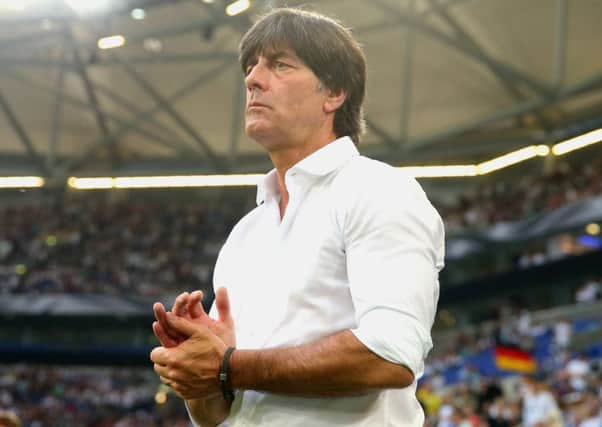Expectations remain high for Germany coach Low


The World Cup victory for a vivacious Germany in Rio two years ago was vital for that populace on several fronts. It served to vindicate the twist on possession football that Germany patented as progression from Spain’s all-conquering tiki-taka style, an approach where power-plays supplanted patient passing. Moreover, by annexing the World Cup for a fourth time, the Germans equalled Italy for the haul of the prized global booty.
To confirm that this is truly a Teutonic era in football on the international stage, success in France over the next month is a must. As it stands, Germany and Spain are tied as the most successful sides in the European Championships with three titles apiece. Yet, the fact that the Spanish have won the past two finals allows them a boast that will rankle with a country that consider themselves the continent’s pre-eminent team.
Advertisement
Hide AdAdvertisement
Hide AdFor all that the Germans have seven major tournament triumphs, they have never been in possession of both the World Cup and European Championship trophies – as Spain were through their 2010 World Cup win being sandwiched by their hoovering of Euros. The German nation expects that to change in short order. The only problem is that Low’s team appear to have lost a little of their lustre.
This is unlikely to trouble them tonight in their Group C curtain-raiser in Lens against Ukraine, a country that have never beaten Germany in five attempts. However, in preparing themselves to be confronted by back-to-front sides copying the successful formula of teams such as Leicester City and Atletico Madrid, Low has sought to introduce a new strategy from that which brought them the World Cup two years ago, and only partially succeeded.
That is reflected in the fact that, in the past 12 months, Germany have been beaten five times. To put that in context, they lost only twice in the two years leading up to their World Cup final win over Argentina in July 2014. Their vulnerability when faced with rudimentary opponents was never better illustrated than when beaten 1-0 in Dublin by the Republic of Ireland in October, a result that ended Scotland’s Euro 2016 qualifying hopes.
Low retains the services of the majority of his Rio rampagers – the retired Philipp Lahm and Miroslav Klose notable exceptions – but players such as Manchester United’s fully fit Bastian Schweinsteiger and Jerome Boateng are not in the form of two years ago because of lengthy injury absences. “Basti is fit, making a good impression,” Germany assistant coach Thomas Schneider said of the former Bayern Munich man who missed three months of the season with a knee injury when questioned at the team’s training base the other day.
“He can be a very important player for us with all his class, with all his experience. He definitely doesn’t yet have the substance over long periods, but as a character he is incredibly important for the team and he’s on the right path.”
In trying out a three-man defence and experimenting with the forward line in recent games, Low doesn’t seem as sure of himself or his side as was true ahead of the Brazil finals. Indeed, after 12 years coaching the international team – the past ten as No.1 – the 56-year-old is understood to desire a move into club management. He recognises that, even as a world champion, without a second title to his name he will have been considered to have stayed in post too long.
He is believed to have coveted the Everton job, and his name is regularly mentioned in despatches as a possible replacement for Arsene Wenger at Arsenal. Claiming Euro 2016 would be a calling card for the sort of club coaching role he considers befits him but there are few who believe that he and his team are exhibiting the chemistry of potential winners.
It is 20 years since Germany won a European championship, Oliver Bierhoff’s golden goal earning the 2-1 final win over the Czech Republic at Wembley. The former striker is now team manager with the national side and willingly articulates the obvious desire of his countryfolk. “We should write a new story and bring the fourth European Championship star to Germany,” he said.
Advertisement
Hide AdAdvertisement
Hide AdThere are only a couple of new players in the squad to help tell such a tale. One of these is 26-year-old left back Jonas Hector. Another notable new name is Bayer Leverkusen centre back Jonathan Tah. He received a late call-up as the result of Roma defender Antonio Ruediger tearing a cruciate ligament in his right knee in training on Tuesday. Tah’s inclusion means that Germany’s squad is the youngest at Euro 2016, with an average age of 25.81 years, a shade younger than England’s squad where the average is 25.84.
Theoretically then, Germany have a squad that could dominate over the next decade as Spain did for much of the last one. Football, though, has a habit of preventing theories being put into practice.